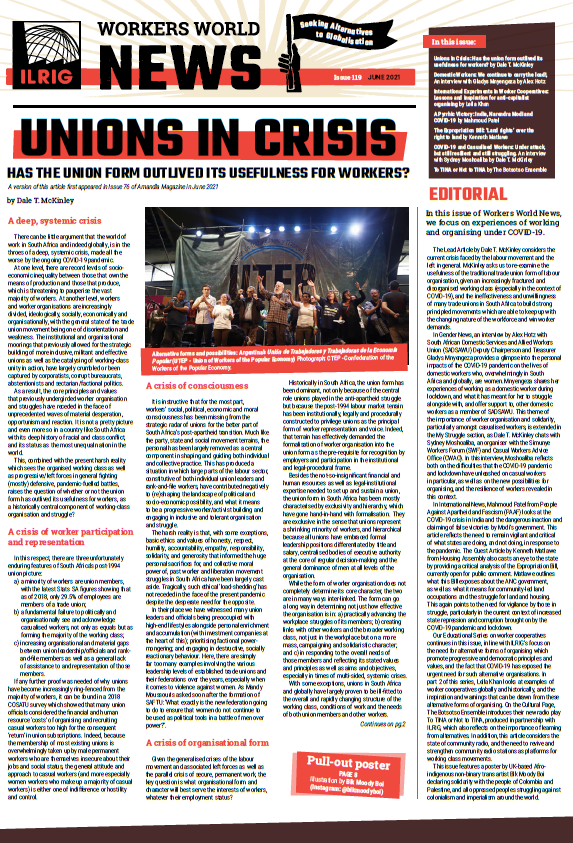In this issue of Workers World News, we focus on experiences of working and organising under COVID-19. The Lead Article by Dale T. McKinley considers the current crisis faced by the labour movement and the left in general. McKinley asks us to re-examine the usefulness of the traditional trade union form of labour organisation, given an increasingly fractured and disorganised working class (especially in the context of COVID-19), and the ineffectiveness and unwillingness of many trade unions in South Africa to build strong principled movements which are able to keep up with the changing nature of the workforce and win worker demands.
In Gender News, an interview by Alex Hotz with South African Domestic Services and Allied Workers Union (SADSAWU) Deputy Chairperson and Treasurer Gladys Mnyengeza provides a glimpse into the personal impacts of the COVID-19 pandemic on the lives of domestic workers who, overwhelmingly in South Africa and globally, are women. Mnyengeza shares her experiences of working as a domestic worker during lockdown, and what it has meant for her to struggle alongside with, and offer support to, other domestic workers as a member of SADSAWU. This theme of the importance of worker organisation and solidarity, particularly amongst casualised workers, is extended in the My Struggle section, as Dale T. McKinley chats with Sydney Moshoaliba, an organiser with the Simunye Workers Forum (SWF) and Casual Workers Advice Office (CWAO). In this interview, Moshoaliba reflects both on the difficulties that the COVID-19 pandemic and lockdown have unleashed on casual workers in particular, as well as on the new possibilities for organising, and the resilience of workers revealed in this context.
In International News, Mahmoud Patel from People Against Apartheid and Fascism (PAAF) looks at the COVID-19 crisis in India and the dangerous inaction and claiming of false victories by Modi’s government. This article reflects the need to remain vigilant and critical of what states are doing, and not doing, in response to the pandemic. The Guest Article by Kenneth Matlawe from Housing Assembly also casts an eye to the state by providing a critical analysis of the Expropriation Bill, currently open for public comment. Matlawe outlines what this Bill exposes about the ANC government, as well as what it means for community-led land occupations and the struggle for land and housing. This again points to the need for vigilance by those in struggle, particularly in the current context of increased state repression and corruption brought on by the COVID-19 pandemic and lockdown.
Our Educational Series on worker cooperatives continues in this issue, in line with ILRIG’s focus on the need for alternative forms of organising which promote progressive and democratic principles and values, and the fact that COVID-19 has exposed the urgent need for such alternative organisations. In part 2 of this series, Leila Khan looks at examples of worker cooperatives globally and historically, and the inspiration and warnings that can be drawn from these alternative forms of organising. On the Cultural Page, The Botsotso Ensemble introduces their new radio play To TINA or Not to TINA, produced in partnership with ILRIG, which also reflects on the importance of learning from alternatives. In addition, this article considers the state of community radio, and the need to revive and strengthen community radio stations as platforms for working class movements.
This issue features a poster by UK-based Afro-indigenous non-binary trans artist Blk Moody Boi declaring solidarity with the people of Colombia and Palestine, and all oppressed peoples struggling against colonialism and imperialism around the world.
